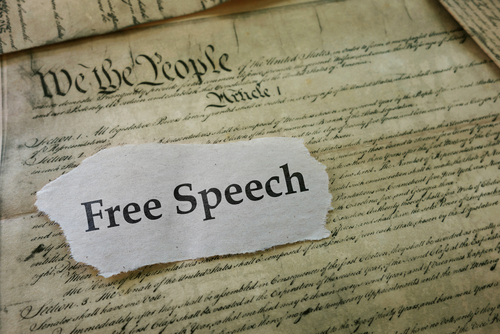Political discussions between employees at work become heated, negative political social media posts go viral, off-duty employees are photographed participating in off-duty protests, or workers show up at work wearing pins, buttons, or shirts emblazoned with political slogans. It seems these things are happening more frequently, and third parties are more willing to complain to employers about off-duty events they find offensive.
What Can Employers Do?
Let’s use the example of an off-duty employee who posts a politically charged message on social media. The post goes viral, and several customers relay their anger to the employer.
The employer wants to fire the employee, but before making this decision or taking some other adverse action, it should review potentially applicable laws, policies, and employment contracts.
- First Amendment: While this is most often cited by employees as protection of their right to say most anything, it’s important to remember that First Amendment protections are directed at government action to prevent speech. It applies to public but not private employers, and not all speech is protected even for public employees. Speech that incites imminent violence or lawless action, is a true threat, contains obscenity (as defined by applicable law), or is defamatory (also as defined by applicable law) isn’t protected.
- The National Labor Relations Act (NLRA) applies to private but not public employers, as well as union and non-union employers, and protects private employees’ right to collectively discuss their terms and conditions of employment. Employers need to ask themselves, “Does the offensive post list complaints about working conditions or concerns about the terms and conditions of employment?” If so, the post may be protected speech. Courts have held that Facebook posts about work conditions that discuss an employer and are “liked” by coworkers are protected under the NLRA.
- Federal and state antidiscrimination law: Is the employee advocating for a protected group? Where political speech intertwines with commentary on protected characteristics like race, gender, or religion, it may be protected.
- State law: Some states have laws that protect employee political speech while off duty, and some protect employees from retaliation for lawful off-duty conduct. Additionally, state law may provide that employment is “at will” unless there’s a contract or policy that provides otherwise.
- If an employee has a written employment contract that governs the termination of employment, it should be reviewed. Some employment contracts provide that employees may only be terminated for “cause,” and “cause” should be defined in the agreement.
- An employer may have a written policy that addresses some or all of these situations. For example, a dress code that bars employees from wearing any message should be uniformly enforced. An exception for a “patriotic” message but not for a political or social one could unfairly impact one group in favor of another.
In addition to checking applicable law, your policies, and any applicable contract, you should analyze and document the business reason for taking an adverse action against an employee.
For example, has the reputation of the business been negatively impacted, has employee morale suffered, have you received customer complaints, or have sales dropped? A documented nondiscriminatory factual reason for the adverse employment action may be a defense to a claim of wrongful termination.
Recommendations
- Have written policies, including a social media policy. Some policies prohibit posts in conflict with company values when employees identify where they work. State that only a certain department can actually speak for the company.
- Enforce policies neutrally and consistently. Exceptions can be perceived as discrimination if a permitted message touches on a protected category like gender identity, race, national origin, or religion.
- Train managers to be politically neutral at work. Managers giving political opinions can create the perception that dissenting views won’t be tolerated, so claims of hostile work environment, harassment, or discrimination are possible.
- Educate employees about the law and policies—for example, why the First Amendment doesn’t apply if you’re a private employer.
What type of speech is permitted may change depending on the facts of the situation, so it’s a best practice to consult with a qualified attorney before making any employment decisions. For assistance with this and other workplace issues, please contact your McAfee & Taft labor and employment group attorney.
Roberta Fields is an attorney in the Oklahoma City, Oklahoma, office of McAfee & Taft. She can be reached at roberta.fields@mcafeetaft.com.




